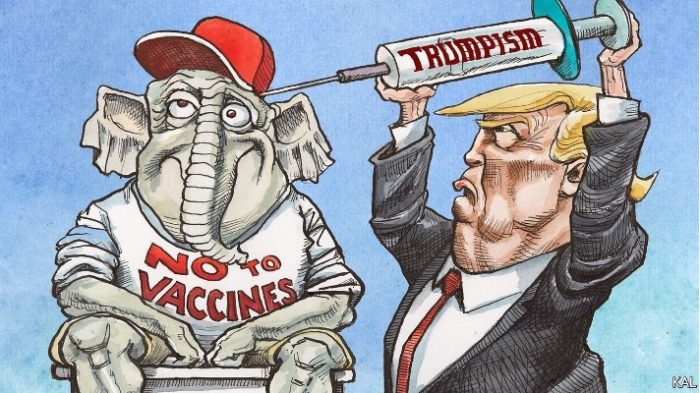Breaking the stereotype

Those who forego the covid vaccine are portrayed as uninformed, stupid, evil or –even worse– Trump supporters.
According to the Economist– a magazine written by people who think they know everything for people who want to think they know everything, “America’s vaccination programme is stalling. Populist conservatives are to blame.” They even printed a cartoon equating Trumpism with anti-vaxism, ignoring the fact that President Trump was an early proponent of Covid vaccines back in April 2020 despite Saint Anthony Fauci’s advice that it would take years to produce a safe and effective vaccine.
Under Operation Warp Speed, the USA bought 100’s of millions of shots on spec- that is to say, before they were even created and tested. That is why America now has a vaccine glut. We literally can’t give away the vaccine. I can’t even watch the Mets on TV without being bombarded by ineffective ads encouraging people to get the vaccine.
My lived experience tells me who are the real vaccine refuseniks, and it’s not always who you think. To be sure, there are those who are afraid of being implanted with a 5G tracking device and those afraid of shedding mutant mRNA. There are the libertarians who don’t want to be controlled by the government. Some are young people who don’t think the benefit outweighs their personal risk. But, the largest group of vaccine refusers are the same people who skip their colonoscopies and avoid statins. Its not a political thing. They just don’t like to take medicine.
One vaccine avoider surprised me, though. He is a 50ish research scientist with disheveled hair who speaks with an Eastern European accent. He is the kind of patient who brings in hand-written spreadsheets of his last 10 years of labs. During his annual visits, he always spends 20 minutes theorizing about why his phosphorous is 0.1 below the lower limit of normal. So, I was taken aback to see him double-masked and wearing gloves because he hasn’t been vaccinated. Turns out that he only leaves his house once every 2 weeks for a carefully orchestrated trip to the grocery store. I imagine it goes something like a hostage rescue mission. Get in. Get the goods. Get out. No one gets hurt.
He was concerned about possible long term side effects of the vaccine, but also quite afraid of contracting the disease. I told him what I knew, though I suspect he has researched the issue more thoroughly than I have. So, I was also surprised that before he left, he asked if I was dispensing vaccine, as if he would get the vaccine if I could inject him. The rest of the day I wondered, “Does the risk-benefit ratio change if I’m the one who dispenses the vaccine?”









Amazing, and sad how this has to CONSTANTLY be turned into a political point. I got the virus, and have chosen not to get the vaxx. Family and friends constantly argue with me, receive my points with skepticism, and try to draw political inference. I repeat again that it’s a medical decision totally apart from politics, peer pressure, etc, and I just get the know-it-all, condescending looks and shrugs.
Cartoon of Trump sticking a syrnge into the head of an elephant wearing a red hat and “No to vaccines” T-shirt.
Couldn’t that just as easily be a cartoon of Bobby Kennedy Jr., sticking a syringe into the head of a donkey?
https://www.mcgill.ca/oss/article/covid-19-health-pseudoscience/anti-vaccine-propaganda-robert-f-kennedy-jr
Seems to me, in the recent past, the vaccine refusers came from the left.
https://www.seattleweekly.com/news/the-anti-vaccine-epidemic/
The schools ran alarmingly high “philosophical” refusal rates. The schools included the Hebrew Academy (not a Jewish thing, as far as I know, vaccines are just fine to most people of the Jewish faith, a few sects are exceptions). Various Montessouri schools, Vashon Island which tends to get a hppie crowd.
Now the vaccine refusal seems to come from the right. And I thought we got the vaccine as fast as we did, thanks to Trump administration policies. Go figure.
Considering that the lowest immunization rate is among African Americans who last I checked did not vote for Trump in very high numbers via assumption that the vaccine is stalling because of conservatives is false. As the article mentioned the same people not getting this vaccine are largely people who are non-compliant or are young The same groups that miss their appointments and frequently are uninsured. It has nothing to do with politics and thus the magazine is incorrect with their falsehoods.
Hahaha! Awesome post!! Yes, sometimes people surprise me. I know so many just normal people who haven’t been vaccinated.
Now I am a Trumpster, but I got my vaccines back in February. I’m definitely pro-vax across the board. And so is President Trump!